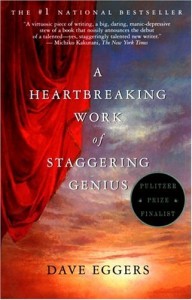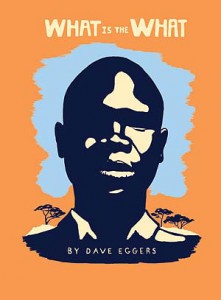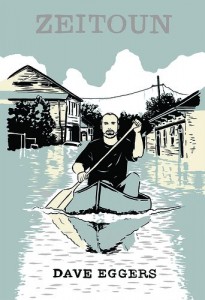Generally when I become clued in about a new author I try to read their work in the order in which they published it. I guess there is no real reason other than I like to see the evolution of the writer as it occurred, their interests, style etc. I do not always succeed at doing this, as is the case with Dave Eggers. The first book of his that I read was Zeitoun, followed a few months later by What is the What? I recently got a copy of his memoir, A Heartbreaking Work of Staggering Genius. I was going to read it in Germany, but then I didn’t. I had good intentions. Anyway, I just got around to reading it and now I feel conflicted.
 Conflicted because I’m somewhat in awe of Eggers’ ability to put his subject’s voice at the front of his other books, when the memoir shows that his own voice is so strong. The author’s voice in A Heartbreaking Work of Staggering Genius is nothing like the voices you get in Zeitoun and What is the What? I think I’m just having a hard time reconciling the fact that all of these books were written by the same person. I’m also not sure which voice it is that I find the most appealing. Eggers as he presents himself in A Heartbreaking Work of Staggering Genius is simultaneously appealing, astounding, and revolting and you know he did that on purpose.
Conflicted because I’m somewhat in awe of Eggers’ ability to put his subject’s voice at the front of his other books, when the memoir shows that his own voice is so strong. The author’s voice in A Heartbreaking Work of Staggering Genius is nothing like the voices you get in Zeitoun and What is the What? I think I’m just having a hard time reconciling the fact that all of these books were written by the same person. I’m also not sure which voice it is that I find the most appealing. Eggers as he presents himself in A Heartbreaking Work of Staggering Genius is simultaneously appealing, astounding, and revolting and you know he did that on purpose.
A Heartbreaking Work of Staggering Genius is a memoir, so as such it chronicles the period in Eggers’ life right before the deaths of his parents and the years following in which he takes over the responsibility of raising his younger brother. Eggers has a lot of self loathing going on, and while I love his honesty his feelings about writing about himself hit a little too close to home for me. They made me uncomfortable because I had to think about things I didn’t want to think about. Writing about yourself is weird. Writing about the people you know is even weirder, especially if they are going to find out you’ve been writing about them. I joke all the time with my parents that I’m going to turn their lives in a book and that is what is going to win me my first Pulitzer and launch my career. Eggers didn’t win the Pulitzer for this one, but it was a finalist. He did something I’ve always jokingly yet seriously considered doing and it freaked me out.
The only piece of writing I’ve ever done about myself and my family was to write down my September 11th story. We all have one and with 10 years separating me from those events I felt the need to have it written down somewhere. I pitched it, felt guilty about possibly benefiting from a story about a tragedy and about my family, and was more than a little relieved about the rejections that came back to me. Then I also felt rejected by the rejection and was sad that a story that meant so much to me wasn’t going to be heard. I think you can see the same mixture of emotions taking place in A Heartbreaking Work of Staggering Genius. Although Eggers’ story ended up quite successful.
My perception was that he desperately wanted the story to matter to someone other than himself. I feel like that is perhaps a characteristic of all writers, we want what matters to us to matter to you. More so when we are talking about ourselves. My story of September 11th and of my relationship with my parents feels like the most important story I have to tell. But the idea that what is so important to me wouldn’t matter to anyone else, and is not even comparable to the tragic tales of the rest of the 6 billion people in the world makes my feelings about the story fall flat. Then again, despite all of Eggers self-flagellation about everything his book was really well received. Perhaps because we all enjoy watching a car crash. All of us are voyeurs, we cannot help but be curious to peer inside the tragedies of others. But that still doesn’t make my story matter.
A Heartbreaking Work of Staggering Genius left me feeling unsettled. It is brilliantly brutal. It reads the way I’d like to someday be able to write. It also reads like the diary of someone with more than a few screws loose. I find this impossible to reconcile with the pitch perfect precision of Zeitoun. I now feel like I need to go read everything else by Eggers in an attempt to understand someone I will never actually know. He is not just the author, he is his own character, and I cannot help but be compelled to continue as a voyeur. I want the author’s voices to make sense, but perhaps there is no way for it to make sense. Perhaps the beauty of the whole experience is in seeing the author’s ability to unleash himself with such incredible force in one book, and disappear completely into the background in another. Regardless, I’m impressed and I recommend his work highly.

